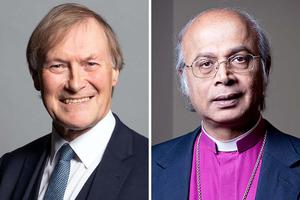Kenya’s Bishops Condemn Garissa Attacks
In an April 8 statement, they called on Kenya’s government to increase security and address the issue of terrorism and radicalization of Muslim youth.

NAIROBI, Kenya — Catholic bishops and interfaith leaders on April 8 strongly condemned the April 2 attack carried out by the Somali terrorist group Shabab at a Kenyan university college in Garissa, about 220 miles northeast of the Kenyan capital of Nairobi.
More than 140 students and a number of security officers manning the institution were massacred by the terrorists, who deliberately targeted Christians as their victims.
In a press statement read out to the media by the president of the Kenya Conference of Catholic Bishops, Cardinal John Njue of Nairobi, the bishops said, “We strongly condemn the heinous terror attack visited on innocent, promising, young Kenyans and all those others going about their duties at the university college.”
The bishops expressed hope that the Kenyan government would address the issue of terrorism and radicalization, with a view to proactively preventing such incidents.
“In the meantime, we urge the government to beef up security, especially in all educational institutions in the country and also address the now-obvious breakdown in the security intelligence system,” emphasized the Catholic bishops.
“It is saddening that many Kenyan youths are being radicalized to commit acts of terrorism against their fellow citizens,” the bishops’ statement said. “We all need to join efforts and embrace a spirit of nationalism and patriotism among all of us. It is unfortunate that some terrorists are living among us yet we are not reporting them to the relevant authorities. We need to respect the dignity of all human persons.”
Cardinal Njue earlier had consoled victims of the April 2 act of terrorism, who had gathered at Nairobi’s Chiromo funeral center, a part of the University of Nairobi, where the families of the nearly 150 victims of the attack had gathered to collect the bodies of their loved ones for the burial rites in their respective rural and urban localities.
During the April 8 visit, Cardinal Njue — who was accompanied by scores of clergy, religious and the laity — prayed with the families and distributed an assortment of food as part of the Church’s contribution to the attack’s victims.
In their statement, the Kenyan bishops said, “While the government is expected to provide security to all the people in all parts of the country, we observe that all of us have a responsibility to support the government by being vigilant and providing information on any suspicious persons and items within our immediate environment.”
The bishops also counseled parents, guardians and teachers on the need to be more observant of the behavior of children in their care, for the purposes of identifying any unusual, negative, suspicious or violent tendencies.
“Such behavior should be dealt with immediately or support sought from relevant institutions or authorities,” the bishops have advised, stressing, “Time has come for Kenyans to be more patriotic.”
They have suggested that the country’s Ministry of Education, the Teachers Service Commission, Boards of Management and University Councils should carefully and continuously vet all employees to ensure that they are not used to radicalize students and recruit them to join subversive groups.
And the bishops urged all of the country’s religious leaders to desist from teaching and preaching hatred for people who do not subscribe to their religion and doctrines.
Everybody has an inalienable right to life and fundamental freedoms, especially to religious beliefs, and as such, they should not be perceived as nonbelievers, the Kenyan bishops said.
Other Voices
Meanwhile, also on April 8, the Coast Interfaith Council of Clerics Trust, a coalition of Christian, Muslim, Hindu leaders in Kenya, issued a statement denouncing the atrocity.
“We condemn with the strongest terms possible this cowardly and heinous act by the terrorists who killed innocent students in Garissa University,” the statement said. “As religious leaders, we wish to send our heartfelt condolences to the families, friends and relatives of those who lost their lives. We pray that the almighty God will be with you during this trying moments and that he will give all of you comfort as you confront this tragedy.”
The statment was signed by Father Wilyard Lagho, chairman of the trust, Archbishop Martin Musonde of the Archdiocese of Mombasa, Father Lawrence Mutisya of the Archdiocese of Mombasa, Anglican Bishop Lawrence Dena, the chairman of the National Council of Churches of Kenya, Sheikh Muhdhar Khitamy, chairman of the Supreme Council of Kenya Muslims, Sheikh Munir Mazrui, treasurer of the interfaith trust, Kishore Shah and Norottam Kataw, trustees of the Hindu Council of Kenya, evangelical bishop Jeremiah Kisekwa of the Organization of African Instituted Churches and Sheikhs Mwinyi Ali and Sheikh Fowwzy Twaha of the Council of Imams and Preachers of Kenya.
Observers of the continuing attacks instigated by Shabab militants note that some Islamic mosques, mainly in the country’s coastal city of Mombasa, have been accused of serving as recruitment and radicalization centers for Muslim youths.
Condemnation has also been directed at the Muslims who have carried out the attacks for the way that, both in Garissa and in previous incidents, including a recent attack in Mandera in northern Kenya, the killers have separated Christians from Muslims before murdering their non-Muslim victims.
Pope Francis’ Message
In his solidarity message with the people of Kenya, contained in a telegram from Vatican Secretary of State Cardinal Pietro Parolin, Pope Francis condemned the assault, calling it an act of “senseless brutality.”
Underlined the papal condolence message, “In union with all people of good will throughout the world, His Holiness condemns this act of senseless brutality and prays for a change of heart among its perpetrators.”
Register correspondent Francis Njuguna writes from Nairobi, Kenya.
- Keywords:
- francis njuguna
- garissa
- islamic terrorism
- kenya

















